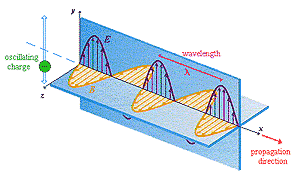Hand-Crank Generator DIY STEM Kit
$9.99$6.50
 An electromagnetic wave, as its name implies, consists of alternating electric and
magnetic fields, oriented at 90 degrees to each other, moving at the speed of light.
These
alternating fields sustain themselves because electricity (moving electric charges)
generates a magnetic field, and a changing magnetic field generates an electric field.
An electromagnetic wave, as its name implies, consists of alternating electric and
magnetic fields, oriented at 90 degrees to each other, moving at the speed of light.
These
alternating fields sustain themselves because electricity (moving electric charges)
generates a magnetic field, and a changing magnetic field generates an electric field.
 'A theory with mathematical beauty is more likely to be correct than an ugly one that fits some experimental data. God is a mathematician of a very high order, and He used very advanced mathematics in constructing the universe.'
'A theory with mathematical beauty is more likely to be correct than an ugly one that fits some experimental data. God is a mathematician of a very high order, and He used very advanced mathematics in constructing the universe.'